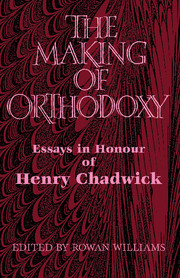Book contents
- Frontmatter
- Contents
- Preface
- List of abbreviations
- Bibliography of Henry Chadwick
- Does it make sense to speak of pre-Nicene orthodoxy?
- ‘And I have other sheep’ – John 10:16
- Reason and the rule of faith in the second century ad
- Adam in Origen
- Panegyric, history and hagiography in Eusebius' Life of Constantine
- Matthew 28:19, Eusebius, and the lex orandi
- The achievement of orthodoxy in the fourth century ad
- Eunomius: hair-splitting dialectician or defender of the accessibility of salvation?
- Some sources used in the De Trinitate ascribed to Didymus the Blind
- The rhetorical schools and their influence on patristic exegesis
- Pelagianism in the East
- The legacy of Pelagius: orthodoxy, heresy and conciliation
- Augustine and millenarianism
- Divine simplicity as a problem for orthodoxy
- The origins of monasticism
- Artistic idiom and doctrinal development
- Index of modern names
- Index of ancient and medieval names
- Index of sources
Does it make sense to speak of pre-Nicene orthodoxy?
Published online by Cambridge University Press: 08 October 2009
- Frontmatter
- Contents
- Preface
- List of abbreviations
- Bibliography of Henry Chadwick
- Does it make sense to speak of pre-Nicene orthodoxy?
- ‘And I have other sheep’ – John 10:16
- Reason and the rule of faith in the second century ad
- Adam in Origen
- Panegyric, history and hagiography in Eusebius' Life of Constantine
- Matthew 28:19, Eusebius, and the lex orandi
- The achievement of orthodoxy in the fourth century ad
- Eunomius: hair-splitting dialectician or defender of the accessibility of salvation?
- Some sources used in the De Trinitate ascribed to Didymus the Blind
- The rhetorical schools and their influence on patristic exegesis
- Pelagianism in the East
- The legacy of Pelagius: orthodoxy, heresy and conciliation
- Augustine and millenarianism
- Divine simplicity as a problem for orthodoxy
- The origins of monasticism
- Artistic idiom and doctrinal development
- Index of modern names
- Index of ancient and medieval names
- Index of sources
Summary
Henry Chadwick's inaugural lecture as Regius Professor at Oxford sketched out, economically and elegantly, some aspects of the problem confronting every historian of early Christian thought, the problem of how to discern and define the self-perception of the first Christian communities: how, with reference to what, did they define themselves? Chadwick portrays a tension between two models of authoritative self-identification, the ‘circle’ and the ‘ellipse’ – the unified institution with a definable centre providing a norm or touchstone for right belief, and the network of communities linked by their common origins in Jerusalem and the events transacted there at the navel of the earth. In some sense, the narrative of Paul's career as set out in the Acts of the Apostles dramatizes this tension: the movement is necessarily and inevitably away from Jerusalem, itself originally the centre of a ‘circle’, the church of the circumcision (pp. 4–5), towards the administrative heart of the Roman civilized world (pp. 12–16); but Rome cannot replace Jerusalem or assert a unilateral sovereignty over the churches that stem from the events in Jerusalem. In spite of all temptations (and efforts), Rome never comes to be taken for granted as the sole standard of the church's self-definition; the circle model never quite triumphs (p. 12). In one way or another, the idea of the church as a family united in virtue of its ancestry rather than of its present organizational structure persists.
- Type
- Chapter
- Information
- The Making of OrthodoxyEssays in Honour of Henry Chadwick, pp. 1 - 23Publisher: Cambridge University PressPrint publication year: 1989
- 32
- Cited by



